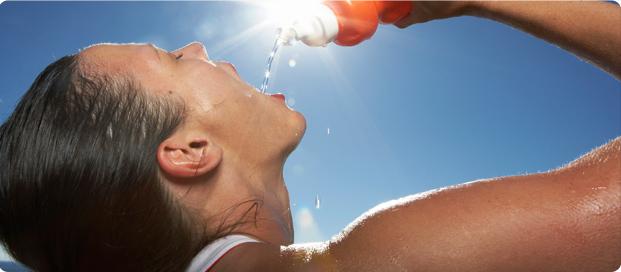Discover how to prevent heat stroke with this tips. Check out the article we found over at Top 10 Home Remedies.
Heatstroke, also known as sunstroke, is a severe condition in which the body cannot cool itself through sweating and becomes overheated.
People are more likely to first have a heat cramp or heat exhaustion, which are less severe conditions. But when these problems are not treated and controlled in time, they lead to heatstroke.
Heatstroke is common among people living in hot, humid climates. It happens mainly due to a combination of dehydration and heavy exertion out in the sun.
Other factors that increase your risk are drinking alcohol, wearing excessive clothing, strenuous physical activity, sweat gland dysfunction and cardiovascular disease.
The main sign of heatstroke is a sudden increase in body temperature. Other symptoms include fatigue, headache and dizziness, decreased perspiration, muscle cramps or weakness, a rapid pulse rate, nausea and vomiting, flushed skin or redness, difficulty breathing, confusion and even loss of consciousness.
Anyone can experience this problem during the hot summer days, but some people are more susceptible to it. Elderly people aged 65 or older are more likely to get heatstroke. People traveling to hot, humid places for the first time are also at a higher risk.
Heatstroke can be fatal if not treated right away. Always seek professional help. Without proper treatment, it can cause severe damage to the brain or other vital organs.
However, there are many precautions and lifestyle changes that can help prevent heatstroke.
Here are the top 10 ways to prevent heatstroke.
1. Avoid Peak Sun Hours
Stay out of the sun during the hottest part of the day, between 10 a.m. and 4 p.m. However, if it is very hot before or after these times, also avoid being out in the direct sun during those times.
If possible, schedule outdoor activities for the coolest times of the day, early morning or after sunset. If you need to go out when it is hot, make sure to apply sunscreen, wear a hat and stay in the shade whenever possible. Also, do not forget to carry a water bottle with you.
2. Get Acclimated to the Heat
Allow your body to acclimate to the heat to increase your ability to do strenuous work during the hot summer days. Acclimating means gradually getting your body used to the climate.
A sudden change in temperature can cause illness. So, after spending a long time in the sun, rest a bit before going into an air-conditioned building. This will prepare your body to handle the change in temperature.
Similarly, after sitting in an air-conditioned area, stay outside in the shade for some time before going out in the sun.
If you travel to hot climates for vacation or work, allow your body to get used to the heat before spending your day outside.
3. Exercise Carefully
Exercise is good for your overall health, but any strenuous activity in the daytime during the summer months can raise your body temperature, leading to heat exhaustion or heatstroke. During the summer season, plan your exercise routine accordingly.
- Avoid strenuous exercises during the day.
- Avoid playing outdoor sports during the peak hours of the day.
- Schedule your vigorous exercises for cooler times of the day.
- If you go for a morning walk, do it before the outdoor temperature becomes too high.
- Do aerobic exercises indoors and take regular breaks.
- Consume enough fluids before, during and after exercising.
- You can also opt for a gym, but make sure it is air-conditioned.
4. Park Your Car Sensibly
When parked in the sun, the temperature inside your car rises quickly. In addition, the oxygen level inside the car becomes dangerously low. This can lead to heatstroke and even death.
- Park your car in a shady place.
- Always lock your car after parking to prevent children from getting inside.
- Do not sit in a parked car. Instead, stand outside your car under some shade.
- Do not leave children or elderly people in a parked car, even if it is for a few minutes.
- Do not leave animals, especially dogs, in a parked car.
- Do not take a nap inside a parked car during the hot summer.
- If you need to sit in the car on a hot day, make sure the air conditioning is on or at least open the windows all the way.
Read full article: How to Prevent Heatstroke







Recent Comments